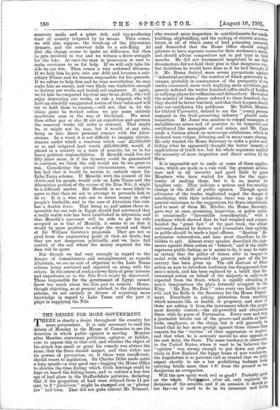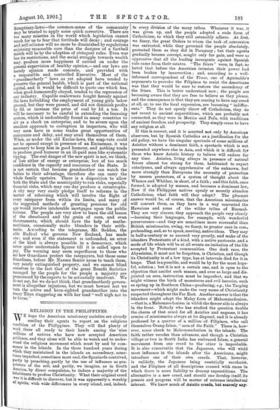' THE DESIRE FOR MORE GOVERNMENT. . . T HERE is
clearly a desire throughout the country for 'more government. It is only necessary to read the debate of Monday in the House of Commons to see the directiOn in which public oPinion is moving. Member after Member, statesman, politician, agitator, or faddist, rose to expose this or that evil, and Whether' the Object of Iiii,ottack was sinnll or great his remedy was always the • sOnie, that the State should inspect, - and then either use its powers.. of. prevention, or; if those were insufficient, should resort to legislation.. Sir Charles Dilke made quite along. speedha very good one—begging the Home Office to.shorten the-time during which fresh herrings could be kePt.en board the fishing-boota, and to enforce a less free yyesss of lead glaie in the Staffordshire potteries; declaring t, t',if the proportion of lead were reduced from 11 per Tit: to 2 " plumbism " might be stamped out as " phossy law " had-been. That did not quite content Mr. Tennant, who wanted more inspectiOn in establishments for wadi, building; shipbuilding, and the making of electric accuniu- lators; in all of which cases of lead poisoning occurred, and demanded . that the Home Office' should compel printers to hoye separate rooms for their workmen's raeabs, and should -.advise: compositors not to. put type in 'their mouths. He did not -recommend. inspectors to see that dressmakers did not hold their pins in that dangerous way, 'but doubtless he would have done so if he had thought of it. Mr. Burns desired' more severe precautions against industrial accidents," the number of which grievously in. :creases,-probably in consequence of the prosperity of the trades concerned, more work implying more accidente;apd gravely indicted the twelve hundred coffee-stalls of L4flon as rallying-places.for ruffianism and debauchery. 'Hewaated the number of these places reduced to-three hundred; that they should be 'better watched, and that their keepers should take out certificates like publicans. • Mr. Talbot, Meraliar for Oxford University, desired.to, see. the " young persons engaged in the fruit-preserving industry " placed under inspection: Mr.-Jones was anxious to compel managers of metalliferous mines •andi of :quarries- to be inspected and certificated like managers- of coal mines, and Mr. Caine made a furious attack on mutoscope exhibitions, which-he declared were vulgar, debasing, and in many cases obscene. He. only wanted the Home Secretary-to order a police•raid, failing whit he. apparently thought the- better - remedy. of applications of-lynch law; but -his •whole argument implied the necessity of More inspection and direbt :action :byithe State.
:It is-.impossible not .to: smile at some of these applica- tions,' Which. are 'made as a rule with the greatest- semi- ness .-asid • in all' sincerity. -and'...goincr, faith 'by ','grase Members • .Who have' Waited for days for' the. oppor- tunity of making „them; -but it no matter for latghter only. They indicate a serious and fax4eachhig change in 'the drift of public opinion. ThOtgh special advocates of the trades implicated urged the dang,er of 'interfering with their industries, there was no sign. iof 'general resistance to the suggestions for State interference, and to most of• them Mr. Ritehie.,. the Rothe Secretary, gave way at once, promising inspection, or police action, or occasionally "favourable consideration," with 'a readiness which showed- that he had weighed and coMpre- hended the " great fact" of the post week, the almit universal demand by doctors and journalists that spitting in public 'should -be made 'a legal offence. " Sputum " dis- seminates tuberculosis, and men must' therefore be-for7 bidden to-spit."Almost every- speaker described the argu- thetas against State action as " belated," and if the dehite expiesses'palic feeling, as it seems to do, it maybe taw as certain that- the policy • of laissez caller in respect'to social evils which governed the :greater part of the last century has been given Up. The old distrust of gate action as sure to introduce confusion has disappeared from men's minds, and has been replaced by a belief that dis- interested action on behalf of the majority it only to he expected from' the State, Which is- rapidly' obtaining: in men's imaginations' the 'place formerly occupied by the King. " Ha Rot, Ha Rot 1" cries every one liable to any evil, and his Rollo is the Secretary for the Home Depart- ment. Everybody is asking protection - from anythaig which menaces life, or health, or propriety, and nioat•of them are asking it from .the instrument which the people most directly control,—the all-powerful and • ubiquitous State, with its purse of Fortunatus. Every now and then a journalist breaks -out of the groove and scolds at land- lords, employers, or the clergy, but it will 'generally be -found that he has more grudge against those classes than concern for the " victims of- their oppression or negleit, and that when he is' seriously moved he also appeals' to the new deity, the State. The same tendency is observable in the United . States, where it used to 'be- believed that "opinion " :was strong enough to put down any abuse; while in New Zealand, the happy home of new tendencies. the Legislature is so paternal and so trusted that eve fu 111 expect shortly to see• a law prohibiting hodmen carrying bricks more than 5 ft. from the groun& an too dangerous an occupation.. . . , Will the new spirit work evil or good ? Probably go:;`,1. on the wllole. Parliment, after all, only. registers .141° decisions of the sensibTe, and if. on occasion it should Fo too far—as it used to do -in its incessant '• and futile pumptiniry-laws:.--the common-sense of the community' may be trusted to apply some qinck corrective. There are too many miseries an the world which legislation cannot reach for us to fear that fortitude will decay ; and courage end seif.relianee will no more be diminished by regulations enjoining reasonable care than the dangers of a football match will beby the-adoption of stringent rules. -Even war has its restrictions, and the social struggle towards wealth may produce more happiness if carried on under the general supervision of • healthy opinion,—and our laws are merely opinion made concrete, and provided with a responsible and controlled Executive. Most of the grandmotherly " laws as yet adopted have tended to preserve the general health, which is part of the national capital, and it • would be • difficult to quote one which has, when good-humouredly obeyed, tended to the repression of any industry. Capable coalowners fought fiercely against the laws forbidding the employment of young girls below ground, but they were passed, and did not diminish profits by 6d. or increase the price of coal by ld. a ton. It will be necessary to be careful in extending the licensing system,- which is undoubtedly found in many countries to act as a check on enterprise, and to be severe upon the smallest, approach to corruption in inspectors, who will very soon have in some trades great opportunities of annoyance and delay, and may avail themselves of them. When, as under the old Excise-laws, the soap-vats could not be opened except in presence of an Exciseman, it was necessary to keep him in good humour, and nothing tends to produce good humour in an ill-paid man like systematic tipping. The real danger of the new spirit is not, we think, of loss either of energy or enterprise, but Of too much confidence in the capacity and resources of the State. It is not certain that because grandmother can watch the babies to their advantage, therefore she can carry the whole family upstairs. There is a disposition to allow both the State and the municipality to rim risks, especially financial risks, which may one day produce a catastrophe. A city may very easily- pledge itself to reforms in the -matter of rehousing which will involve the flight of -every ratepayer from within its limits, and many of the suggested methods of granting pensions for old age would involve intolerable mortgages upon the public fortune. The people are -very slow to learn the old lesson of the chessboard and the grain of corn, and even Governments, which should have the help of mathe- maticians, occasionally make blunders in their arith- metic. Acecrding to the telegrams, 'Mr. Seddon; the able Radical who governs New Zealand, has made one; and even if the statement is unfounded, an error of the kind is always possible in 'a democracy, which never quite understands figures till it is called upon to pay. The warning may seem superfluous to those who see how Guardians protect the ratepayers, but those same Guardians, before Mr. Nassau Senior• arose to teach them, very nearly extinguished property, and we cannot • blind ourselves to the fact that of the great , Benefit Societies• managed by the people for the people a majority are pronounced by the experts to be actuarially insolvent. We do not say, for we do not think, that grandmotherly govern- ment is altogether injurious, but we_must beware lest we turn the active and keen-sighted grandmother into the weary Titan staggering on with her load" well nigh not to be borne."



































 Previous page
Previous page